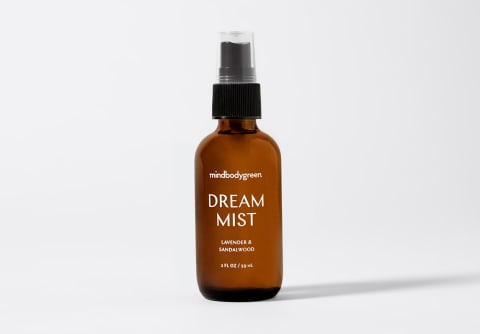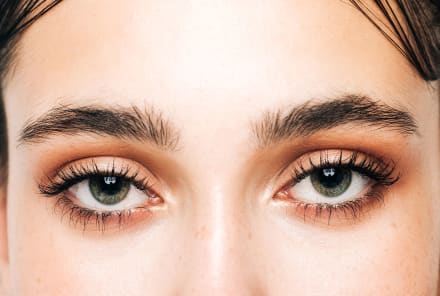Advertisement
7 Calming Scents To Soothe Your Senses & Help You Unwind, From Experts

Everyone has their own go-to methods to unwind after a long, busy day. For some, it's a few evening stretches or a walk around the block; for others, it's a mindful journaling session coupled with meditation. Many even rely on their nighttime skin care routine to clear their heads and prepare their minds for rest. No matter how you choose to wind down, adding a calming scent to the rotation can soothe your senses and elevate the experience even further.
Although, if you want to use scent to your full advantage, it takes a little more effort than lighting a subtly sweet candle. Yep, we're talking about aromatherapy: Ahead, experts share the most calming essential oils to fold into your routine and how to use them for prime relaxation.
How does scent help you relax?
Smell is actually our most primal sense and serves as a survival mechanism. "Your olfactory nerve is the only cranial nerve in direct contact with your external environment," says natural skin care expert Sarah Villafranco, M.D., founder of Osmia. "Nerve endings inside your nose are in contact with the air you breathe, and when they connect with scent molecules, they activate express messages to primal parts of your brain that control things like emotion, memory, and pleasure."
Essentially, your olfactory system can quickly indicate whether an environment is safe or not, and certain essential oil aromas (we'll get into specifics soon, promise!) contain chemical components that lull your senses and elicit relaxation1.
"The connection between scent and emotion is lightning-fast, which is why aromatherapy can be such a powerful tool," Villafranco continues. "There are many essential oils2 that can calm you down, the most studied of which are citrus oils3 and lavender4."
Best calming scents.
Let's get into specifics, shall we? Here, find the expert-backed scents for a calm, quiet mind:
Lavender
When you think of soothing scents, chances are you think of lavender. It's one of the most popular essential oils for relaxation, and its floral, tranquil aroma makes it quite the crowd pleaser. "My favorite calming scent is lavender essential oil by far," agrees aromatherapist Valencia McClure, founder of The Artistry of Essential Oils. Not only does it have a restoring aroma, but research shows smelling lavender can even improve the quality of rest. A bonus? It's one of the more affordable oils, too.
Roman chamomile
Ever sip on a warm mug of chamomile tea before bed? If so, you already know how great chamomile is for easing the mind and helping you unwind after a busy day. Similarly, you can envelop your senses with the delicate, herby essential oil and create a relaxing atmosphere. For those who prefer just a whisper of fragrance, chamomile is a dream: It adds a soft, subtly sweet aroma without overpowering your space.
Sandalwood
Sandalwood is a prized essential oil in India (where it's originally found), often used for spiritual ceremonies and meditation. The scent profile bears no resemblance to floral or sweet citrus whiffs—it has a warm, rich, earthy note. However, many users find the woody scent grounds the body and helps them find a quiet headspace. For those who crave a little more oomph than traditional lavender blends, adding sandalwood can make the scent more dynamic and luxurious.
Cedar
Another woodsy scent, cedar also has a soothing effect on the mind (Villafranco considers it one of her favorites!), and research shows cedrol, a specific compound in cedar essential oils, is associated with calming effects5. The scent is also commonly used in meditation rituals to promote a sense of spirituality.
Vetiver
"I also find vetiver6 extremely calming," notes Villafranco. "It's distilled from the deep roots of vetiver grass and has a soothing, yet clarifying, effect." It's a popular addition to massage oils, thanks to its ability to ground the mind7 and even promote quality of rest.
Neroli
McClure favors neroli, a "beautiful aroma of floral and citrus" that has been shown to have a calming effect on the mind. Its sophisticated yet bright scent makes it a popular addition to many perfumes, and neroli even has some skin and hair benefits, to boot. "With high antioxidants and cell regeneration properties," Australian dermatologist Daniel Lanzer, M.B., FACD, once explained to mbg, "Neroli oil can produce an amazing overall glow."
Bergamot
Bergamot is functional wellness practitioner Mariza Snyder, D.P.'s personal favorite essential oil. "It's got this beautiful rich scent," she previously told mbg, and it's associated with feelings of positivity8 and a balanced mind.
How to use calming scents.
Selecting the calming scents is only half of the equation: It's important to figure out how you'll incorporate said scents into your routine. Below, find a few tried-and-true methods:
Diffuser
"Using a diffuser can help prepare a room for sleep or meditation, but it should not be left on for hours on end," notes Villafranco. Not to worry: Most diffusers come with automatic timers. This Stone Diffuser from Vitruvi, for example, features four-hour and eight-hour run times (and looks especially chic on your bedside, might I add). Or feel free to browse mbg's favorite diffuser options here.
No diffuser? No problem. "A few drops of essential oil on a tissue placed nearby can act as a mini-diffuser," Villafranco adds.
Room sprays
For a quick spritz of calm, room sprays (or pillow mists, or sleep sprays, or whatever you call them) can easily create a relaxing atmosphere. Plus, rather than creating your own essential oil blend, many formulated sprays already come with multiple calming scents to elevate the experience. mindbodygreen's dream mist, for example, blends lavender, sandalwood, Roman chamomile, and linden blossom to encourage relaxation in the body and mind.
Additionally, room sprays are great if you're looking for a moment of pause during a busy day. All it takes is a few spritzes to soothe your senses.
Topical application
Topical essential oils can have a calming effect when applied properly on your pulse points—on your wrists, base of the neck, temples, and soles of feet, according to McClure. The skin is the thinnest at those points, which means it's closer to your blood and body heat. And as the fragrance warms, the aroma process begins.
Just make sure you properly dilute the essential oils with a carrier oil (jojoba, olive, etc.) before applying. You never want to put an essential oil directly on your skin, as they're super potent and can cause irritation. If you're at all concerned about your DIY skills, go ahead and grab a market product. Osmia’s Night Body Oil is a solid choice—it features soothing lavender, cedar, and Roman chamomile with a jojoba and avocado oil base.
Expert tips & warnings.
A final word from the experts:
- Again, never apply undiluted essential oils directly on your skin. That will do way more harm than good.
- "The quality of your oil matters," says Villafranco. "There's a lot of junk on the market, so look for a reputable company that sources pure essential oils using sustainable methods."
- If you choose to diffuse, make sure to use it in a room with proper ventilation, says McClure. Otherwise, the strong smell might irritate your throat or nose. On a similar note, you don't want to run the diffuser 24/7.
- Says Villafranco, be mindful about how you use aromatherapy. "Less is more—all lavender all the time is likely far less effective than small doses of lavender used with intention, like during meditation or before sleep," she says.
The takeaway.
Calming scents can elevate your wind-down routine a few notches and promote a relaxing headspace. Or if you'd like a grounding moment throughout a busy workday, scent can be a powerful tool to help ease your mind. On the flip side, certain essential oils can invigorate and energize your senses: If you're looking for mental clarity and focus, check out these popular scents.
8 Sources
- https://www.sciencedirect.com/science/article/pii/B9780443104039000030
- https://www.ncbi.nlm.nih.gov/pmc/articles/PMC9026314/
- https://www.ncbi.nlm.nih.gov/pmc/articles/PMC6304613/
- https://www.ncbi.nlm.nih.gov/pmc/articles/PMC3612440/
- https://pubmed.ncbi.nlm.nih.gov/12898420/
- https://www.ncbi.nlm.nih.gov/pmc/articles/PMC8197530/
- https://pubmed.ncbi.nlm.nih.gov/25553641/
- https://www.ncbi.nlm.nih.gov/pmc/articles/PMC5434918/
Watch Next
Enjoy some of our favorite clips from classes
Enjoy some of our favorite clips from classes
What Is Meditation?
Mindfulness/Spirituality | Light Watkins
Box Breathing
Mindfulness/Spirituality | Gwen Dittmar
What Breathwork Can Address
Mindfulness/Spirituality | Gwen Dittmar
The 8 Limbs of Yoga - What is Asana?
Yoga | Caley Alyssa
Two Standing Postures to Open Up Tight Hips
Yoga | Caley Alyssa
How Plants Can Optimize Athletic Performance
Nutrition | Rich Roll
What to Eat Before a Workout
Nutrition | Rich Roll
How Ayurveda Helps Us Navigate Modern Life
Nutrition | Sahara Rose
Messages About Love & Relationships
Love & Relationships | Esther Perel
Love Languages
Love & Relationships | Esther Perel


















